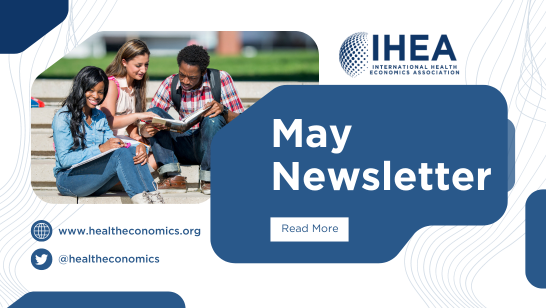Congress Update

To access the full PDF click here.
Yes, You Can…Join the 2023 IHEA Congress Virtually
In just over five weeks, we will welcome well over a thousand health economists from around the world to Cape Town for the 15th IHEA World Congress on Health Economics. The program will provide the opportunity to engage around the latest methodological developments, recent research findings, and the implications of this research for policy and practice in person again. There are also several social events and other opportunities to network and catch up with those you haven’t seen in years.
We recognize that many who would have liked to attend are not able to for various reasons. To increase access to the amazing line-up of pre-congress and main congress sessions, we will have Zoom platforms in every congress venue for live remote attendance and to record the sessions. We will also stream the two plenary sessions on our YouTube channel.
To attend virtually and gain access to the links for each session’s Zoom, please register here by June 30th, 2023. Virtual attendance fees are:
- $40 for Students, Early Career Researchers and those from Low- or Middle-Income Countries
- $80 for Others
Not only will you be able to access sessions live and post questions/comments in the chat box, you will also be able to view any of the recordings of the nearly 250 pre-congress and congress sessions. Recordings will be posted on the virtual congress platform shortly after the congress.
Those registered for the on-site congress will also be able to access these recordings. So if you can’t make it to a particular session, you can view it later.
IHEA’s Equality, Diversity and Inclusion (EDI) Policy in Action at the 2023 Congress
IHEA’s EDI policy has been at the forefront of all planning for the 2023 Congress.
The Scientific Committee is the most diverse ever (see details of the Program Chairs and Review Panel here). The review process was blinded, with guidelines provided for assessing the content of each abstract and raising awareness about potential sources of unconscious reviewer bias and how to avoid it. Submitters of organized session proposals were advised to pay attention to the diversity of presenters and discussants, and no delegate will moderate more than one individual abstract session, to promote inclusion and diversity in moderators. Guidelines are being provided to moderators to promote the inclusion of a range of voices in sessions. Guidelines are also being provided to oral and poster presenters to promote access for those with visual and/or auditory impairments and appropriate audio-visual equipment available in each session venue.
The Cape Town International Convention Centre (CTICC) is a wonderful venue, with full accessibility for those with mobility impairment and many furnished open spaces for noise-free conversations. There is a multi-faith prayer room (near the registration foyer), and a lactation room (behind Auditorium 2) and we will provide facilities for the storage of breast milk. Childcare options are also available.
All catering will be provided by the CTICC, which is fully halal. Delegates have been requested to indicate dietary requirements in the registration system, and careful attention has been paid to developing menus to ensure diversity in food to accommodate dietary preferences and a range of intolerances and allergies.
IHEA has in the past received requests for alcohol-free zones at social events to allow all delegates to participate. Alcohol will only be served in the Clivia Conservatory during the opening reception, and the closing reception will only offer soft drinks and water. The ballroom will be an alcohol-free zone during the gala reception on Tuesday night; alcohol will be served in another area where cocktail tables will be provided for enjoying your beverage and chatting with colleagues.
Importantly, we have been proactive and taken extensive measures to ensure that anyone who would like to attend in person can. We liaised with government departments at an early stage to alert all South African embassies and consulates about the congress, advised delegates to apply for visas well in advance, and provided supporting documentation for visa applications. There has also been direct contact with officials processing South African visas in the countries from which the largest number of delegates requiring visas come, to verify the registration status of individual applicants. We are very grateful for the nearly USD140,000 provided in grants which have enabled financial support to over 160 delegates from low- and middle-income countries.
We look forward to seeing delegates at the congress in Cape Town, which we are striving to make a welcoming and safe space for all. Please see further information about these and other issues in the online program here, including the code of conduct and how to report any inappropriate behavior.
Health Workforce Interest Group in Cape Town
The Health Workforce Interest Group will have a no-host dinner on Monday night after the Interest Group meeting. If you would like to join this dinner, please sign up here.
If you have suggestions for a venue, please email joanne.spetz@ucsf.edu.
Short-Term Global Health Courses at the Johns Hopkins Global Health Systems Summer Institute
Choose from 23 short-term courses during June 5-30, 2023. Most courses are offered online.
The Department of International Health at the Johns Hopkins Bloomberg School of Public Health is hosting a Global Health Systems Summer Institute. The Institute is a great opportunity for early- to mid-career public health professionals to expand their skill sets and improve job performance.
There is a reduced rate for those taking the courses for non-credit. The reduced price is $200 per credit. Most of the courses are 2–3 credits.
Twenty-three courses will be offered, including four health economics courses:
- Behavioral economics in health decisions, June 5 – 8 at 8 a.m. – 12 p.m. taught by Antonio Trujillo
- Disease and program costing in global health programs, June 5 – 9 at 1:30 – 4:30 p.m. taught by Gatien de Broucker and Bryan Patenaude
- Globalization and health: Framework for analysis, June 12 – 15 at 8 – 10 a.m. taught by Andres Vecino-Ortiz
- Introduction to global health economics, June 20 – 23 at 1:30 – 5:30 p.m. taught by Andres Vecino-Ortiz
Other topics include global health technology and innovation, primary health care, global health entrepreneurship, health systems strengthening, health systems management, health policy, health care financing, the private sector and global health, and more. Take as many courses as you’d like.
View the complete schedule and course descriptions.
Information on tuition and how to register can be found here.
UCL Health Economics Analysis and Research methods Team (HEART)
The UCL Health Economics Analysis and Research methods Team (HEART), led by Professor Rachael Hunter, is delighted to announce that we are running our short course, “Understanding health economics in clinical trials”, which is designed for all staff working on clinical trials who are not health economists.
Date and time: Wednesday, June 28, 2023 from 10:00 AM – 4:30 PM
Location: Institute of Clinical Trials and Methodology (ICTM) at UCL 90 High Holborn, 2nd floor, rooms M02/M03, London, UK WC1V 6LJ
Please click here for more details and to register.
Lunch and refreshments are included.
Early bird prices until 11:59 PM on Wednesday, June 7, 2023
- Early bird students: £85
- Early bird academia/NHS/Local Authority: £130
- Early bird industry/private individual: £220
Standard rate from Thursday, June 8th, 2023 onwards
- Standard rate students: £125
- Standard rate academia/NHS/Local Authority: £160
- Standard rate industry/private individual: £280
If you wish to take advantage of any discounts, please use your institutional email address when booking. You will receive a link by email shortly after registering on Eventbrite with instructions for payment, and your place will be confirmed only when you have both registered on Eventbrite and arranged payment via UCL Extend (card or IDT).
Please contact Caroline Clarke (caroline.clarke@ucl.ac.uk) with any enquiries.
Upcoming Webinars
Balancing Samples in Stated Preference Studies
Date: June 5 at 11:00 AM – 12:00 PM EDT
Abstract: There is a growing interest in quantifying the degree of heterogeneity in stated preferences for health. A popular investigation into preference heterogeneity involves split-sample analysis to make comparisons across subgroups. However, subgroups may differ in many observed characteristics and not accounting for these other characteristics may bias comparisons if these are also associated with preferences.
Likewise, recruiting respondents to stated preference studies can be challenging and the study sample may not be representative of the population of interest (e.g., a patient population, the general population). Unrepresentative samples may be useful for indicating preferences but if they differ in characteristics that are associated with preferences, decision-makers may struggle to generalize from the results.
This study explores how weighting and balancing approaches from the causal inference literature can be used in stated preference research to improve the balance of samples. This seminar will cover methods such as propensity-score weighting and entropy-balancing, and examine how these approaches can affect results and the subsequent conclusions drawn using hypothetical (simulated) and empirical examples.
The seminar will finish with an exploration of when these approaches should be used and when they may not be useful, including a discussion of how balancing samples may address barriers to the transportability of preference results for health care decision making.
Speaker Details: Caroline Vass is a Research Economist in the Health Preference Assessment team at RTI Health Solutions. Her research focuses on stated preference research, particularly using discrete choice experiments (DCEs) to elicit preferences for benefit-risk trade-offs. She has methodological interests in both the qualitative and quantitative components of stated preference research. She was invited to co-lead an International Society for Pharmacoeconomics and Outcomes Research (ISPOR) Webinar: Why and How to Use Qualitative Research Methods in Conjunction with DCEs, and recently first-authored an ISPOR Special Interest Group’s report on preference heterogeneity in DCEs. Prior to joining RTI Health Solutions, Caroline completed her PhD and post-doc research at the University of Manchester. As a PhD student she won the Lee B. Lusted Prize at the Society for Medical Decision Making’s (SMDM) 36th Annual Conference. Caroline has given oral presentations of her research at international conferences and has peer-reviewed publications including systematic reviews, editorials, empirical applications, and pedagogical pieces in journals such as PharmacoEconomics, Medical Decision Making, Value in Health, and the Journal of Choice Modelling. She currently sits on the honorary editorial board for The Patient journal.
View all upcoming events online here.
Did You Know
IHEA curates a teaching materials repository, which can be found here. You can find a range of PowerPoint lecture slides, case studies, audio-visual and other materials that can be used by academics in their health economics courses with appropriate acknowledgement. A key objective of the repository is to promote quality health economics teaching through the sharing and use of material as open educational resources. Why not contribute some of your teaching material through the repository!


